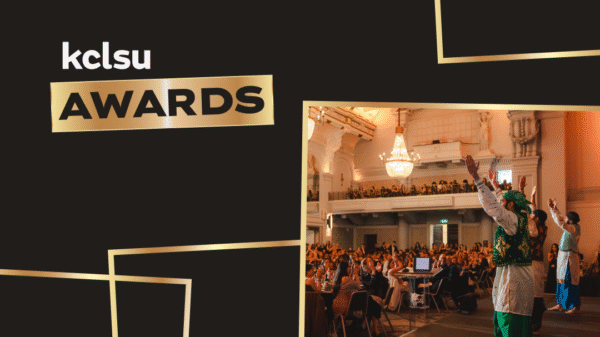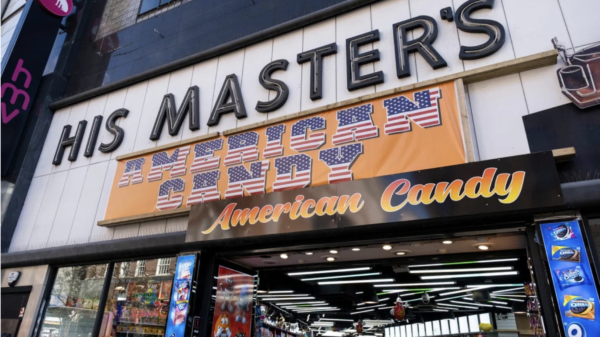Culture Editor Keir Holmes interviews playwright KT Miles and designer Ana Smoleanu, two King’s students who will be showing their play, “In Good Spirits”, at this year’s VAULT Festival.
Right now, we are midway through the VAULT Festival’s 2023 run, which is displaying some of the best theatrical talents that London has to offer. This year, King’s students KT Miles and Ana Smoleanu, alongside director Greta Rilletti-Zaltieri, will have their new play “In Good Spirits” performed at this lively event. Here at Roar, we have been given the opportunity to interview them about this upcoming production and their experiences as students in the London theatre scene.
Roar: Hello, it’s good to be talking to you two. Could you start by describing “In Good Spirits”? What is it about?
KT: “In Good Spirits” is a lighthearted drama about queer joy and found family. It’s asking the question: What happens to ghosts when the haunted house comes down?
R: What have been your main inspirations when making the play? This applies to both the script and the design.
K: I suppose for the script, I was initially really inspired by comedies like BBC’s “Ghosts” and “What We Do in the Shadows”. Also, and this is kind of niche, during an Irish Modernism course in second year the idea of the Big House novel came up, and my brain went: “What about the Big House play?”. So, the working title for the play for a while was “The Big House Ghost Play”. I was thinking about ideas of cultural inheritance and ownership and family in relation to the Big House novel, and I was also thinking about how I could queer this space and make it fun, how I could make it a bit more lighthearted.
Ana: My starting point was also a uni module. It was the Gothic one from second year, it got me interested in ideas about tackiness and the relationship between an alternative outside culture and pop culture. There’s a really weird symbiotic relationship that those two can have, which I translated into KT’s context of the late 80s.
R: Going back to the queer themes that you mentioned KT, on the VAULT Festival website you’ve said that “ghosts are vehicles for non-heteronormative performances of gender, non-linearity, and new subjectivities”. Could you explain what you mean by that?
K: Yeah, I can, and I can also pass the question onto Ana as that’s actually her line. But, very briefly before I do that, ghosts have always been something that queer people relate to. We’re thinking about these ideas of the monstrous, ideas about the other, ideas about the suppressed coming back and haunting. We’re also thinking of Toni Morrison and ideas about Hauntology. I think that there’s something really relatable to queer identities in the use of ghosts. Ana, talk more about it, this is your big thing.
A: There are multiple ways of reading ghosts as queer, but my favourite one is actually reading queerness, or living a queer life, as living after social death, and of queerness as assuming a kind of social death from which you build an alternative life with Utopian, queer potential.
R: You also mentioned that the play is set in the 80s. Why did you decide to focus on this period?
K: It has a very boring reason. So, I was trying to find a context in which to set the play. It’s set in an English stately home, and I needed to think of a reason why this house was coming down that made sense. Then, in relation to the Big House novel, I was thinking about ideas of urban development and the redistribution of wealth. What I needed to know was this: Was there a time period in English history in which the big, stately, colonial home was demolished in favour of urban development? It turns out there was. It was between the 60s and the late 80s, and it kind of stopped around 1990 when the rest of those homes got taken by English Heritage and cultural preservation projects. So, yeah, a very boring, practical reason for why that is the setting. But, there are also ideas about tackiness and ghostliness that suit the setting. I mean, if the 80s is one thing, it is aesthetically tacky. It’s delightful!
R: Researching the play, I found a statement in which you claimed to be committed to “design-led practice”. Could you describe what that is and tell us how this way of working has influenced this production?
A: Well, it’s been a very collaborative process. This sounds obvious because it’s theatre, but we thought that putting this sense of collaboration at the forefront was very important. Understanding how connected the script was with the set, with the costume, with the theory, and with Greta’s directorial voice, and using this as the starting point and prioritising it in every single aspect of production; from the way that meetings were held to the actual broader design and production process.
R: Last question, do you have any advice for students trying to get involved in theatre?
K: Yeah, just do it. The good thing about student theatre is that, while you’re in university, you have a lot of protections and a lot of stuff to fall back on. You know, you’ve got university drama societies, you’ve got people in those who are always wanting to help you, always wanting to do stuff, wanting to act, and wanting to do the tech. In fact, our technical designer is a King’s student as well.
I think that if you’ve got a show, if you’ve got a play, if you’ve got people around you who want to make a play, you shouldn’t be afraid to make an application. Make an application to Vault Festival, or the Peckham Fringe, or the Camden Fringe.
The only thing that will hold you back will be money. Theatre is very expensive, but these places will support you if you’re willing to take it up. We did a lot of fundraising for ours, we got some support from crowdfunding, and we’ve raised enough so that barely any of it is coming out of our own pocket now, which is fantastic.
My advice to people in university wanting to do some stuff on the London theatre scene is to just go for it, because if you want to do it you’ll find a way to do it. You should not let the fear of that hold you back.
“In Good Spirits” will be playing at the VAULT Festival on 18 and 19 February. You can book tickets here.
One particularly useful detail to note, the VAULT Festival offers a group ticket deal which provides groups of eight or more with a 10% discount.
Former Culture Editor for Roar News.















